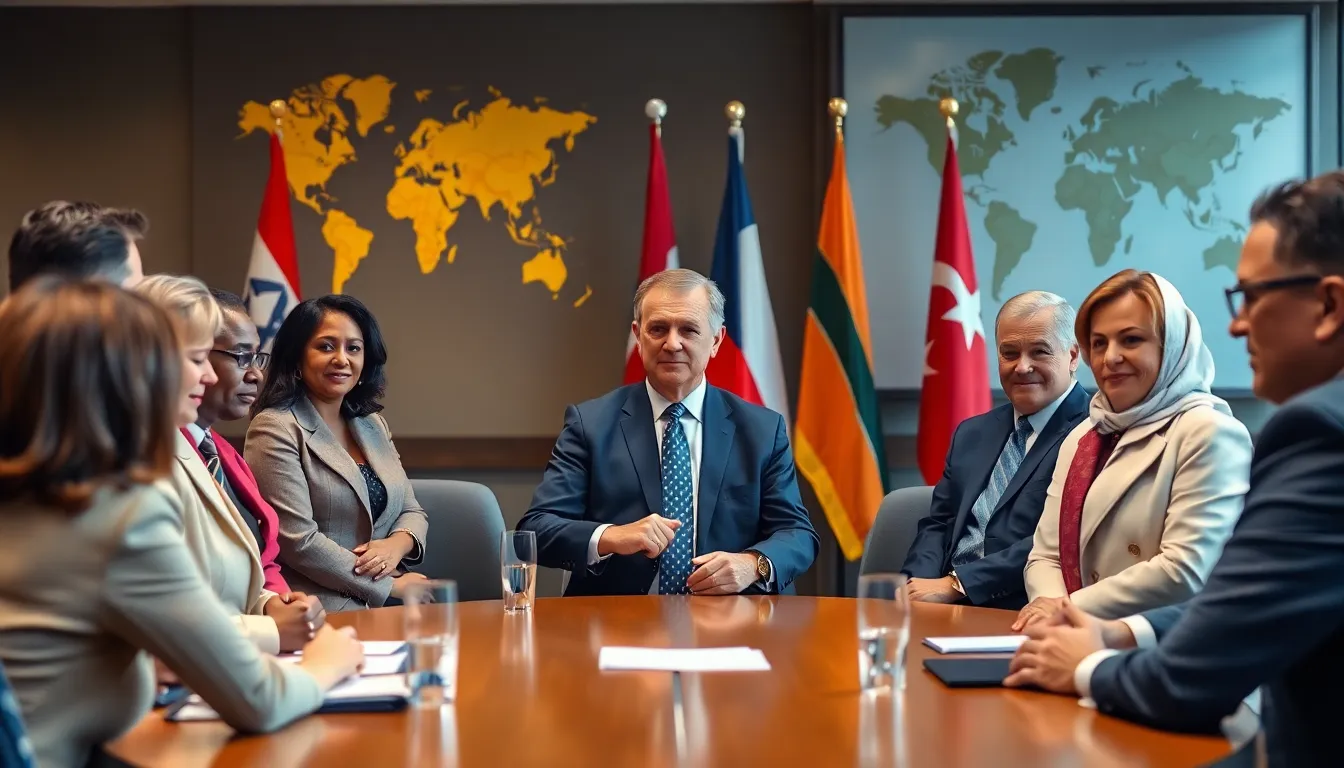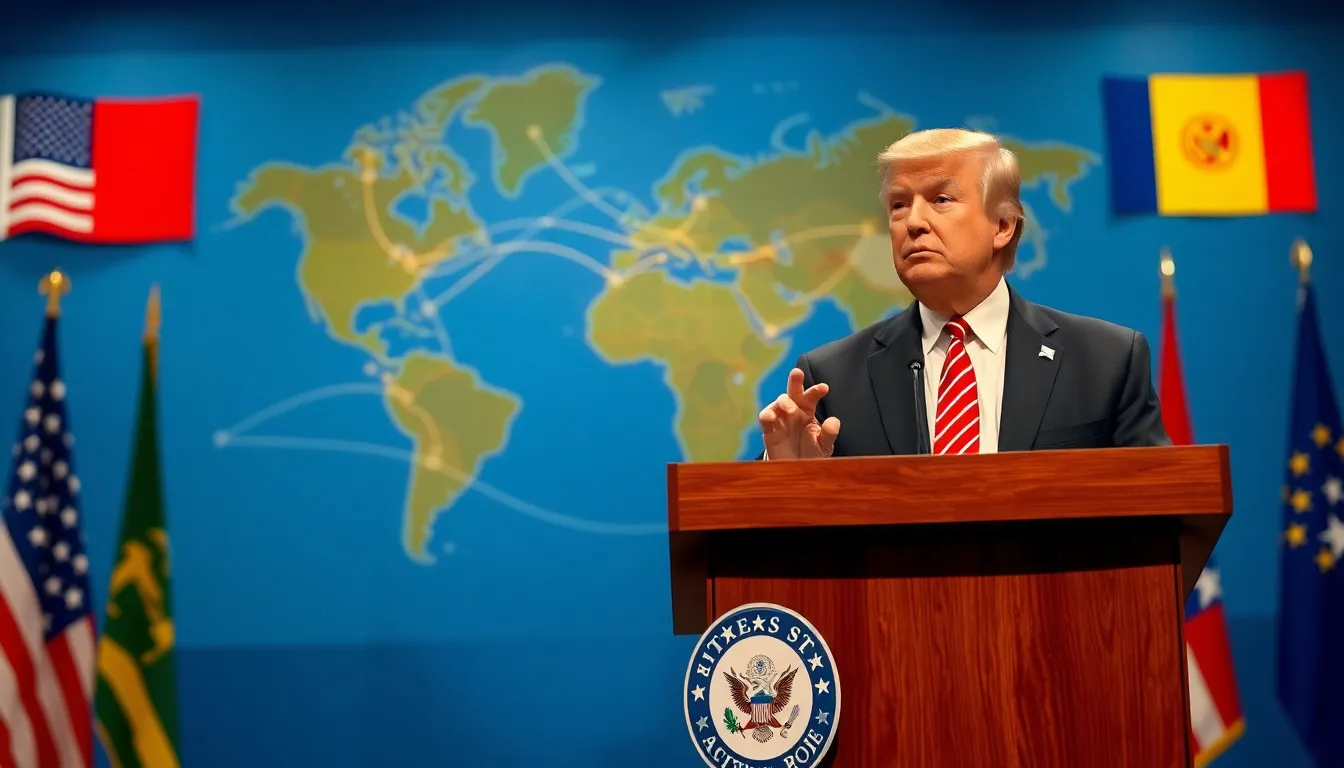Table of Contents
ToggleIn a world that’s more interconnected than ever, international politics shapes the landscape of global relations. Countries navigate complex dynamics, balancing power, diplomacy, and conflict. Understanding these interactions is crucial for grasping how decisions made far away can affect lives at home.
As nations grapple with issues like trade, security, and climate change, the stakes continue to rise. Leaders must adapt to shifting alliances and emerging threats, making international politics not just a subject of interest but a necessity for informed citizenship. This article delves into the key elements that define international politics today, exploring the forces that drive nations to cooperate or clash on the global stage.
Overview of International Politics
International politics involves the complex interactions between sovereign states, international organizations, and non-state actors. It encompasses a range of activities including diplomacy, negotiation, and conflict resolution. Leaders develop strategies to manage relationships, balancing power dynamics and national interests.
Countries face various global challenges that impact international relations. Trade disputes occur when nations impose tariffs or quotas, affecting economic ties. Security concerns arise from terrorism, cyber threats, and military aggression, prompting alliances like NATO for collective defense. Climate change drives cooperation through international agreements, such as the Paris Accord, as nations work toward sustainable solutions.
Understanding international politics is crucial for comprehending the interconnectedness of global events. Decisions by one country can influence economies, security, and policies worldwide. For example, sanctions imposed on a nation due to human rights violations can lead to regional instability and economic repercussions.
Moreover, shifting alliances are common as nations seek to adapt to new geopolitical realities. Countries align during conflicts, respond to emerging threats, and collaborate on global issues. The motivations for cooperation or conflict often stem from historical relationships, cultural ties, or shared interests.
International politics shapes the world stage through intricate interactions that define how nations coexist. Leaders must remain adept at navigating these dynamics to address the evolving landscape of global challenges.
Key Theories in International Politics

Key theories in international politics provide frameworks for understanding the behavior of states and non-state actors. These theories explain how nations interact, form alliances, and respond to global challenges.
Realism
Realism emphasizes power and national interest as the primary drivers of international relations. The theory suggests that states operate in an anarchic system where security concerns dominate. Realists argue that states prioritize survival and will engage in conflict when necessary. Examples of realism’s application include military buildups, strategic alliances, and realpolitik, where countries pursue pragmatic rather than ideological goals.
Liberalism
Liberalism posits that cooperation and mutual benefit form the basis of international relations. This theory highlights the significance of international institutions, trade, and diplomacy in reducing conflict. Liberals believe that democracies are less likely to go to war with one another, a concept known as the Democratic Peace Theory. Examples include the establishment of the United Nations, trade agreements like NAFTA, and the promotion of human rights.
Constructivism
Constructivism focuses on the social constructs that shape global politics. This theory asserts that international relations are influenced by ideas, identity, and discourse rather than solely material power. Constructivists argue that state behavior is shaped by historical narratives, social norms, and the interests of various actors. Examples include the impact of nationalism, international social movements, and how narratives around climate change influence policy.
Major Issues in International Politics
International politics encompasses several pivotal issues that shape global relations and influence national policies. Key areas of focus include global security, economic interdependence, and human rights.
Global Security
Global security refers to the measures nations implement to protect themselves from threats, ensuring stability and peace. Key components include military alliances, arms control agreements, and counterterrorism efforts. Countries often engage in diplomatic negotiations to address conflicts and prevent escalation. The North Atlantic Treaty Organization (NATO) represents a crucial alliance focused on mutual defense, allowing member states to collaborate on security challenges. Recent tensions, such as those involving North Korea’s nuclear capabilities and regional conflicts in the Middle East, necessitate continuous adaptation of security strategies.
Economic Interdependence
Economic interdependence highlights the interconnectedness of national economies through trade, investment, and economic agreements. Nations increasingly rely on each other for resources, technology, and markets. In today’s globalized economy, disruptions can significantly impact multiple countries. For instance, supply chain vulnerabilities exposed during the COVID-19 pandemic illustrated how dependencies can lead to economic instability. Organizations like the World Trade Organization (WTO) facilitate negotiations and dispute resolution, promoting free trade and economic cooperation worldwide. Trade agreements, such as the United States-Mexico-Canada Agreement (USMCA), demonstrate efforts to foster collaboration among nations for mutual economic benefit.
Human Rights
Human rights encompass the fundamental rights and freedoms entitled to all individuals, regardless of nationality. International politics often focuses on promoting and protecting these rights through treaties and advocacy. The Universal Declaration of Human Rights serves as a foundational document, setting standards for countries to uphold. Human rights issues can lead to international scrutiny and backlash when violations occur, as seen in cases involving genocide and ethnic cleansing. Activist groups and international organizations, such as Amnesty International, play a vital role in monitoring and raising awareness about human rights abuses, compelling nations to take accountability for their actions.
Impact of Technology on International Politics
Technology significantly transforms international politics, influencing diplomacy, conflict, and global governance. Nations leverage technological advancements to enhance communication, improve military capabilities, and influence public opinion.
- Communication Enhancement
Communication technologies facilitate real-time interaction between states, enabling swift diplomatic engagement. Platforms like social media allow governments to convey messages directly to citizens and other nations, impacting public opinion and political narratives.
- Cybersecurity Concerns
Cybersecurity becomes paramount as nations face increasing threats from cyberattacks. States must develop robust defenses against hacking, espionage, and cyber warfare, recognizing that vulnerabilities can compromise national security and economic stability.
- Military Modernization
Technology drives military modernization, with countries investing in advanced weapons systems, artificial intelligence, and surveillance capabilities. These developments reshape power dynamics, creating concerns about an arms race and destabilizing regional balances.
- Global Governance
Technology influences global governance structures. International organizations utilize digital tools to enhance collaboration among member states, improving data sharing on issues like climate change, public health, and security threats.
- Information Warfare
Information warfare emerges as a tactic in international relations, with states engaging in disinformation campaigns to influence political outcomes. Strategic manipulation of information challenges traditional diplomatic practices and complicates conflict resolution.
- Economic Implications
Technology reshapes economic relationships, driving trade in digital goods and services. Countries compete for technological supremacy, impacting trade agreements and economic policies, emphasizing the need for cooperation in regulating emerging technologies.
The interplay between technology and international politics continues to evolve, highlighting the necessity for states to adapt and respond effectively to the challenges and opportunities presented by technological advancements.
The landscape of international politics is ever-changing and complex. As nations grapple with pressing global issues like security, trade, and climate change, their interactions will continue to evolve. Understanding the underlying theories and dynamics of these relationships is crucial for leaders and citizens alike.
With technology reshaping diplomacy and conflict, the stakes are higher than ever. The interconnectedness of today’s world demands strategic cooperation and a commitment to addressing shared challenges. As countries navigate this intricate web of relations, the future of international politics will depend on their ability to adapt and collaborate effectively.




